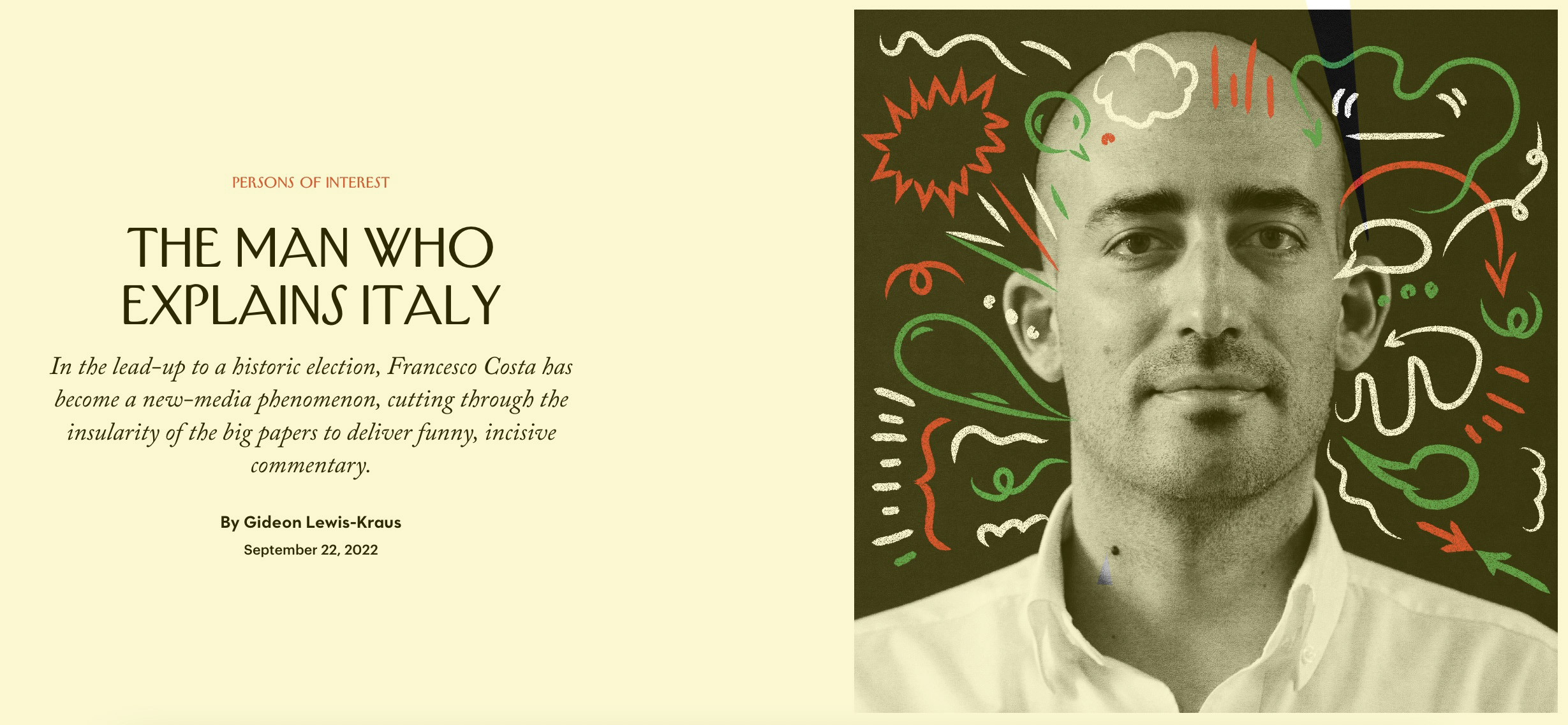Morning, con la erre
Cosa racconta il New Yorker del podcast del Post e del suo autore

Il settimanale americano New Yorker, uno dei periodici più famosi e stimati in tutto il mondo, ha pubblicato sul suo sito un ritratto di Francesco Costa, vicedirettore del Post, e una descrizione del successo del suo podcast Morning, destinato agli abbonati del Post. L’articolo descrive ai lettori americani l’anomalia dell’informazione del Post e di Morning nel panorama italiano, e cita la deliberata scelta di dargli un titolo in inglese con una pronuncia italiana.
Costa’s daily podcast, “Morning,” which is pronounced with a non-rhotic “R” and a phantom vowel at the end, attracts an intensely devoted audience, especially (but not exclusively) among the country’s liberal élite. The show, which appears under the auspices of Il Post, the news site where Costa serves as deputy editor, is subscriber-only—a rarity in a country where media properties have been slow to adopt new business models that have become common elsewhere. The young Italian novelist Vincenzo Latronico told me, “There are journalists who have been caught copying pieces from elsewhere who are still writing front-page editorials in the main newspapers—it’s such a different culture that it’s hard even to explain. Costa’s journalism would be at a high level in the U.S., but in Italy it’s way above what ninety-nine per cent of the other outlets offer. It’s like he appeared from outer space.” The conceit and the operation of the podcast are simple: Costa’s alarm goes off at 4:45 a.m., he reads up to ten daily papers in the next hour and a half, and he sits at his home computer to record a summary, with dry but opinionated commentary, of the day’s news. He edits out the ambulance sirens from outside his apartment, cuts the episode to thirty minutes, and exports the file himself. “The goal is to come out at 8 a.m.,” he told me recently. He continued, with the national shrug, “Sometimes it’s eight, sometimes it’s five minutes early, sometimes it’s five minutes late.”
Morning è una rassegna stampa quotidiana che racconta e spiega le notizie, ma che racconta e spiega anche come le notizie diventano tali sui giornali. Da un anno, Morning fa parte dell’offerta dedicata ad abbonati e abbonate del Post (ci si abbona qui, se vi interessa). Trovate l’articolo intero del New Yorker qui, mentre questo è un passaggio che racconta la storia del Post, e cosa lo rende diverso e speciale nel panorama dell’informazione italiana.
Last year, he started “Morning,” which he describes as a side gig to his role at Il Post, an online-only news organization whose motto is “Cose spiegate bene”—or “Things explained well.” Though he noted that the site, which Sofri founded in 2010, predated the establishment of Vox by four years, he told me that his innovations were nothing new. “I wasn’t being a genius. I was just in touch with what was happening in the U.S., on blogs and in podcasts, and just copied what was working elsewhere.” In Italy, however, this came as a revelation. It was taken for granted that the establishment media wrote largely to and for itself. “They use jargon that people never use and don’t understand,” he said. “They provide no context.” Publications routinely made errors, which they rarely bothered to apologize for or correct. More important, they made no secret of their political affiliations—a center-left senator once described La Repubblica as “our Pravda”—and rarely dwelled on the routine hypocrisy that’s long been endemic to Italian political life. The business model of Il Post was basic precision, firmness, and comprehensibility. “We set out to explain everything like the listener is five years old,” Costa said.


